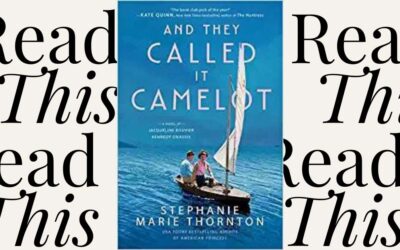When was the last time you wrote for yourself?
Writing is an essential tool in our digital world but at the same time it’s becoming a lost art. The average American office worker writes, on average, 13 hours a week just writing work emails. And when you factor in Slack channels, texting, and work communication? Writer’s fatigue becomes a serious problem.
But much like having a meeting on Zoom is a far cry from having a coffee date with an old friend, just because we’re engaging in words as a means to communicate doesn’t mean it’s edifying.
Productivity is top of mind, and the truth is, when we’re not working, leisure feels guilty. Separating pleasure from productivity has only gotten harder as our workload has increased beyond 9 to 5, and work from home accommodations mean more of us are spending time on a laptop after hours.
Can writing ever be a hobby for us again?
We say: yes- and it must.
It’s self care, therapy, creative growth. Writing is a conduit for the very things that make us human. We must reclaim writing without purpose.
History shows us great examples of how the written word can be leveraged in response to both internal and external struggles. Maya Angelou wrote I Know Why the Caged Birds Sing in response to the difficult world around her. Mary Oliver wrote her poem Oxygen to document the caretaking experience of her partner during the final stages of her life.
Looking to harness poetry for yourself- but not sure where to start?
Here’s what Refined By History’s Lead Editor Meredith Gernigin and contributing author Heather McConell have to say about writing poetry for the work you should be putting first: yourself.
On Where “Proper” Poetic Form Starts- and Ends
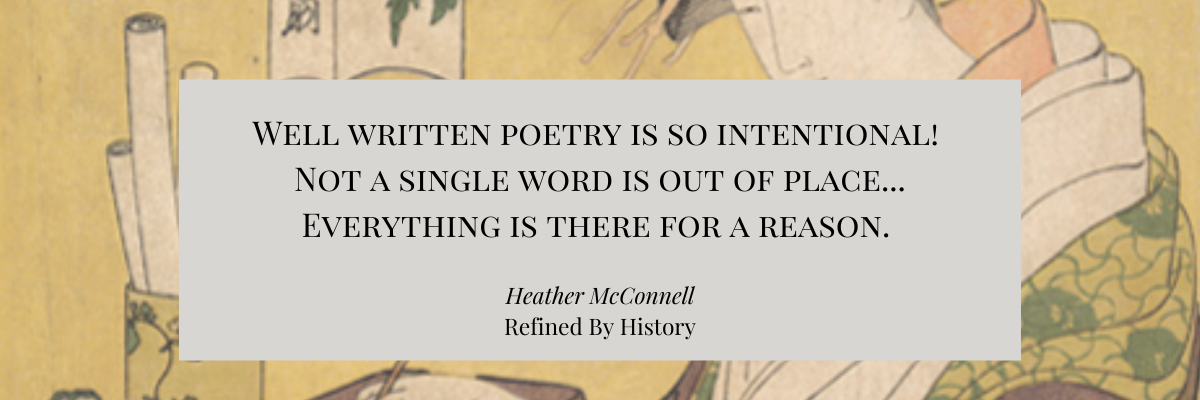
Heather: The poetry I write is very haphazard and very personal. One year, while going through a rough breakup, I wrote 400 poems! I’d catalogue those bursts in google docs and with a friend of mine.
Just knowing someone was reading was a form of processing.
That’s actually how I got started seriously writing poetry- in a university poetry circle.
At the time I didn’t have my eye on writing poetry for publishing, but I found a group of people I enjoyed and discovered poetry from there. You?
Meredith: Writing has always been a part of my professional life, but I didn’t start writing poetry until I started running a small business..
For me it was almost a recalcitrant act: As a business owner, you’re supposed to post a set number of Instagram posts, and I hated writing captions. I hated it! So, I started writing absurd Haikus. They meant nothing and were so obscure.. but they always got a lot of response? I suppose people placed their own meanings on the captions. It was such an odd experience. From that, I started writing things personally.
Heather: I love that!
My poetry is like a stream of consciousness. My friends told me that reading it is like having a conversation with me.
I always veer away from forms. But I recently wrote a sonnet, and it was such an enlightening experience! Instead of this emotional outpouring, it was more like a puzzle
Meredith: Yes! That’s why I like the structure of Haikus- it’s like a puzzle. Before, I kind of thought poetry was just lazy writing. But I realized that good poetry is distilled emotion and thoughts. It’s emotions in their purest form.
Heather: Well written poetry is so intentional! Not a single word is out of place, there’s not an unintentional syllable. Everything is there for a reason.
On Poetic Influence and Growth
Heather: For me, it was Anne Sexton’s poem: Her Kind.
I love how she uses consonants in a rhythmic way, which is something I think about a lot as an opera singer.
Just the start of the poem,
“I have gone out, a possessed witch,
haunting the black air, braver at night;
dreaming evil, I have done my hitch.”
There are so many juicy consonants. I love it.
Meredith: Love it.
Heather: (laughs) Yeah… consonants. It’s also why I prefer singing in German over Italian. I have a real love for rhythm, accent, and punctuation.
Meredith: I’m more of a turn-of-phrase type of person.
For me, that introduction was in my Lit101 class in community college. We read The Love Song of J. Alfred Prufrock by TS Eliot.
The whole poem revolves around the fear of getting old and insignificant in society. The narrator asks, “Do I dare to eat a peach?” He’s so worried about his actions painting him as an invalid- peach juice dribbling inelegantly down his chin. That level of anxiety and self consciousness expressed in such a simple image is brilliant.
On Poetry In Places
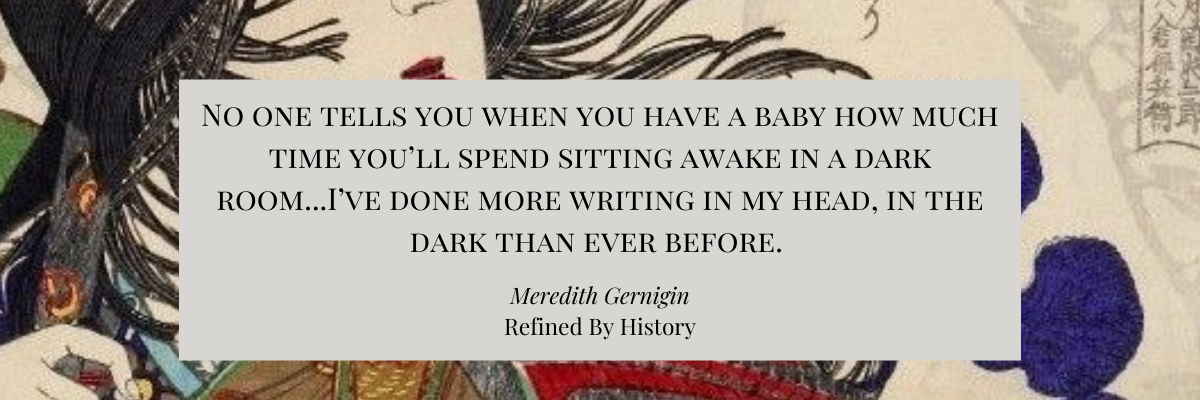
Heather: I write poetry on public transit. I wrote so much poetry on trains. I love train travel. You just stop, sit back, and watch the countryside go by. There’s something about not being able to control where you are, how fast you’re going, when you’ll get there. It’s a liminal space.
At least 50% of my poetry has been written on a train. For me, poetry lives in liminal spaces.
Meredith: So true.
I didn’t really start writing poetry for myself until last year- when we had our son. No one tells you when you have a baby how much time you’ll spend sitting still, awake, in a dark room, for an unspecified amount of time.
I’ve done more writing in my head, in the dark than ever before.
Does Good Poetry Happen in Writing- or In Editing?
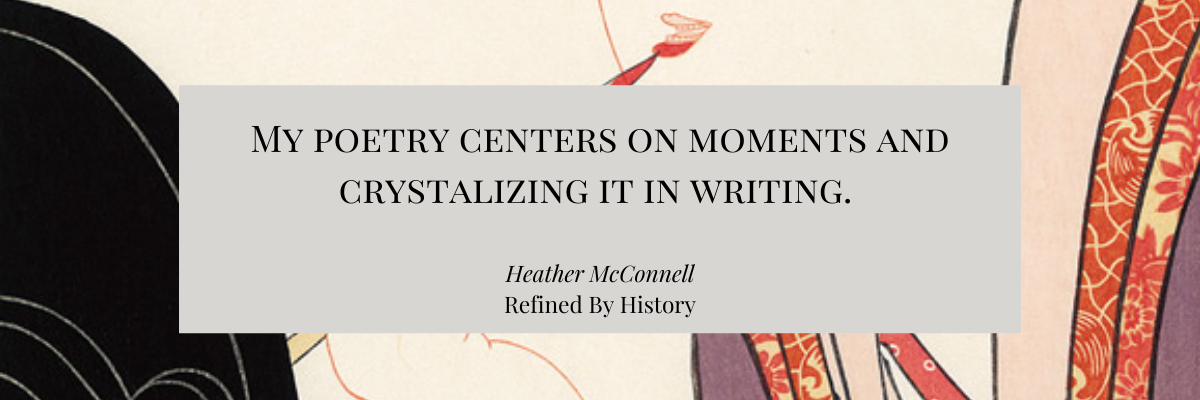
Heather: My poetry centers on moments and crystalizing it in writing.
My biggest guilt when writing is when I don’t capture that special moment in the way I want.
I sort of revise as I go, but I’m really lazy in that revision. If it doesn’t come out right the first time, I get so frustrated! I sort of vomit on the page and if it’s good- it stays. Otherwise it goes in the trash.
Meredith: I’m the opposite- I revise nonstop.
I usually get a concept or a feeling in my head. Unfortunately- it tends to be the very center of the piece. I have to work backwards from there. It’s never linear for me.
On Getting “Better” At Writing Poetry
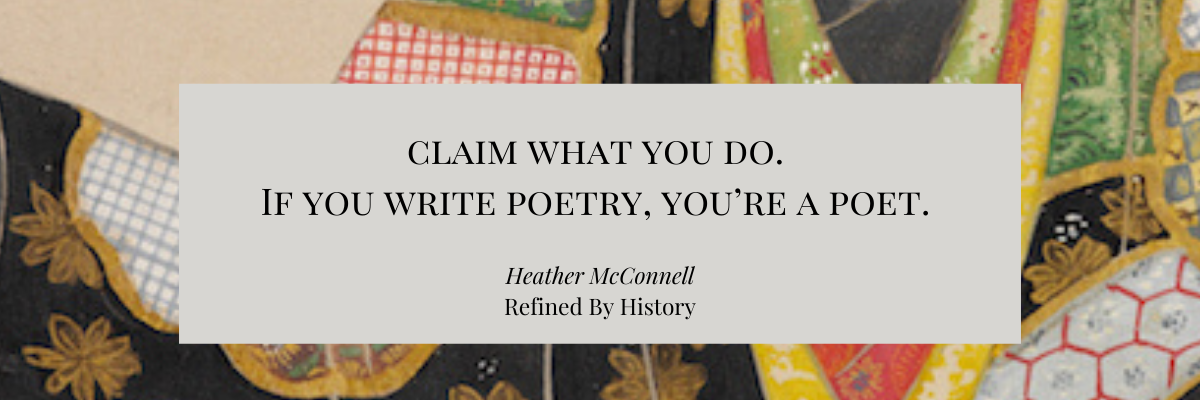
Heather: You just keep writing! There’s no way around it.
Your first time doing anything is shit, but you have to keep with it.
Poetry’s nice because you don’t have to do any planning.
Also, find a trusted source to share your writing with, someone who will bounce back feedback and support.
Meredith: I honestly stopped caring whether what I write is “good” or not. But that really only came with age. I’m not a poet- so I don’t put that pressure on whether something is a good poem or a bad poem.
Heather: I’m going to disagree with you on one thing there: claim what you do. If you write poetry, you’re a poet.
Meredith: (laughs) Ok.
Heather: No really! Poetry is highly personal. Everyone has a poetic soul. If you write it, you’re a poet.
On Their Own Work:
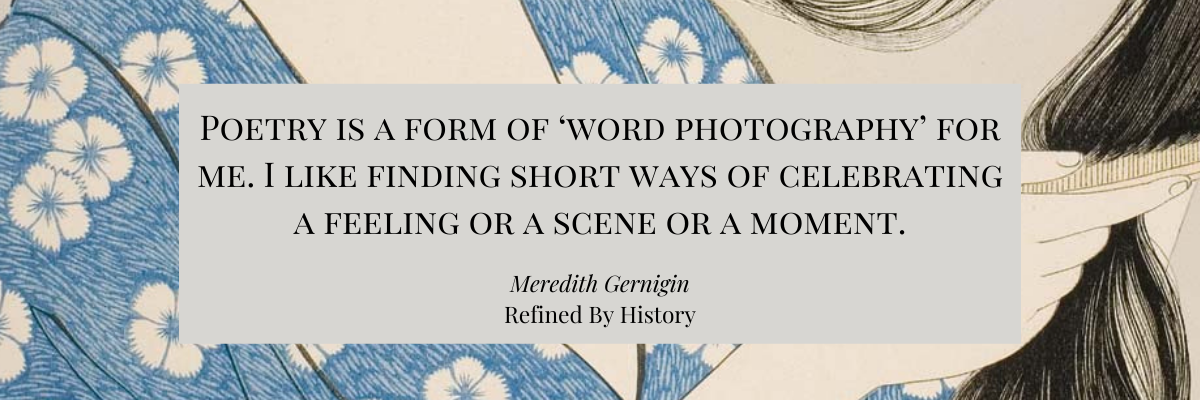
Meredith Gernigin and Heather McConell share some of their personal pieces below- and give a little insight on their origin and process.
Heather: This piece was the one that started that crazy post-breakup poetry sprint…the 400 poems in one year. While now I have a special journal I keep poems in for my partner- and I prefer to write by hand- this was a tumultuous time and all that “normal” process was upended.
It felt weird writing into a glowing screen into the wee hours of the morning but I think the change in material also changed the work.
An Apology from the Author
I felt like you deserved a poem.
I’m sorry I didn’t hand write it first.
There’s something cold
About just typing poetry,
Impersonal-
But our brief relationship
Is just a pile of “sorry” now.
I will try again.
Later, you can see the change in writing. This piece was written post-breakup but also as I felt increasingly isolated in my graduate program. It was the middle of winter: bright but in that very bleak way.
It’s a different facet of the feeling.
Origami
My introversion has
Folded into loneliness.
Everything is
Too bright, too white, too empty, and
I am
Too tired.
Meredith: Everyone tells you when you have a baby you fall in love.
But it’s not like that. You fall in love, yes, but what does that even mean? There are a million different types of love: first love, obsession, true love, deep friendship. Nothing prepared me for the fierce “life and death” love of having a child, how darkly consuming and intimate this act of pulling a soul from your body would be- and the emotions that followed in the wake.
I wrote this 29 days after our son was born.
Hymn
29 days
in hour-measured nights
we spent singing to the sunrise
our bodies wrapped in winter blankets
wrapped together
more hours spent
considering our future
than all loves before
Our Future
you are a hymn
I hear waking
Sleeping
Breathing
Poetry is a form of ‘word photography’ for me. I like finding short ways of celebrating a feeling or a scene or a moment. The first spring we spent in our old Victorian house, I wrote this short piece on the joy I felt digging through the once-loved-now-abandoned garden in our backyard.
Is it a poem? Or is it a chorus I heard the flowers singing? It’s hard to say.
ranunculus
buttercup
my little wild crowfoot-
your own way of wild
grown into each other
do you think if something is beautiful
it’s perfect?



